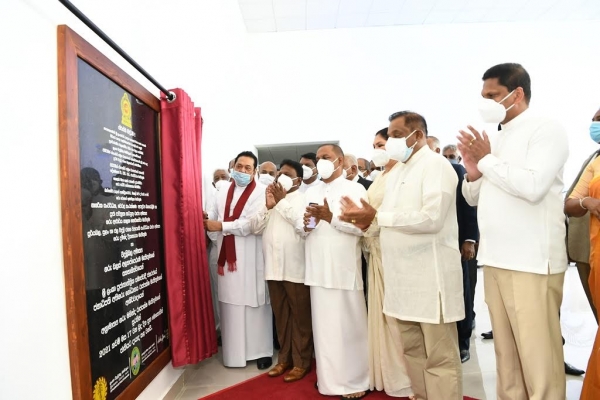Sri Lanka’s first Waste-to-Energy Power Plant was officially launched in Kerawalapitiya on the 17th of February 2021, by the Hon. Prime Minister of the Democratic Socialist Republic of Sri Lanka, Mahinda Rajapaksa, together with the Hon. Minister of Power, Dullas Alahapperuma, Hon. Governor of the Western Province, Marshal of the Sri Lanka Air Force, Roshan Goonetileke, Her Worship, Mayor of Colombo, Rosy Senanayake, Chairman of Aitken Spence PLC, Deshamanya D.H.S. Jayawardena and other dignitaries.
The growing problem of waste disposal was addressed by the Colombo Municipal Council who invited bids for the implementation of an environmentally acceptable and sustainable mechanism for the disposal of municipal solid waste. The Western Power Company (Pvt.) Ltd, a subsidiary of Aitken Spence PLC, was selected through this competitive bidding process and was the only company to complete the project amongst few others. Aitken Spence has since spearheaded the implementation of the project, and its operation is the culmination of years of careful planning and an investment of approx. Rs. 15 billion.
Furthermore, The Western Power Company (WPC) entered into a Waste Supply Agreement (WSA) with the CMC and a Standardised Power Purchase Agreement (SPPA) with the Ceylon Electricity Board, for a tenure of 20 years in 2017. WPC also entered into a contract with a leading Chinese engineering company to design, build, and transfer a modern waste incineration plant. Renowned engineering consultancy firm, Ramboll AG, headquartered in Denmark was appointed as the Owner’s Engineer.
Hon. Prime Minister, Mahinda Rajapaksa, in his well-wishing message stated “The solid waste management process in the city of Colombo has been going on for a long time, facing various challenges. The Kerawalapitiya Waste-to-Energy Project, which was launched as a result of continuous efforts to solve that problem, is unique. It is a milestone in the solid waste management process not only in the city of Colombo, but in entire Sri Lanka. I extend my congratulations to the Colombo Municipal Council for giving pioneering support to this project, and the Aitken Spence Group for giving financial support and implementing the project, the Ministry of Power and the Ceylon Electricity Board”.
Hon. Minister of Power, Dullas Alahapperuma, in his message, stated ''It is the Ministry of Power’s intention, to find a sustainable solution to the waste management problem which is a complex and long-running issue. By generating cost-effective, renewable energy from something that would otherwise cause stench and disgust, we have provided an elegant solution to an age-old problem. As the Minister of Power, I’d like to extend my sincere gratitude to the Ceylon Electricity Board, the Colombo Municipal Council, Aitken Spence PLC, and all those who provided strength, power, and courage to make the Kerawalapitiya solid waste power plant a reality”.
Her Worship, Mayor of Colombo, Rosy Senanayake, in her message, stated “By implementing this waste-to-energy project, Colombo Municipal Council has been able to obtain a sustainable and environmentally friendly long-term solution for the solid waste collected in the city of Colombo”.
Speaking about this landmark project, Chairman of Aitken Spence PLC, Deshamanya Harry Jayawardena commented, “As a diversified conglomerate we have always taken a progressive approach to investment. This venture is guided by the principles of sustainability, responsible corporate stewardship, and progress through innovation and development. It gives me great pleasure to see years of meticulous planning and hard work finally come to fruition. This power-plant will give Sri Lankans access to clean, reliable energy, help with beautification of the city and hopefully set a trend for clean, renewable sources of energy.”
Waste disposal has become a severe problem, especially in the Western Province, where over 3,500 metric tons of household waste is produced daily. In the absence of a waste-to-energy power plant, municipal solid waste will collect in landfills, polluting both the ground water and the environment. The waste-to-energy power plant will incinerate this waste, supplied by the Colombo Municipal Council. 600 – 800 MT of waste will be processed every day and the power supplied to the national grid.
In keeping with the Aitken Spence ethos of sustainability, social responsibility, and environmental stewardship, the plant will incorporate the latest technology to ensure clean energy and minimal impact on the environment. The residue ash (bottom ash) leftover from the incineration of waste is reused to produce cinder blocks for the construction industry, while the flue gas undergoes special catalytic treatment to remove all harmful particles before being released via a 60m tall smokestack. These stack emissions will be tested regularly to ensure compliance with the stipulations of the Central Environmental Authority. The company conducted environmental and social impact assessments at multiple stages before and during the construction of the power plant with the inspections carried out by external, independent parties. The power plant will also be monitored along a stringent social and environmental management system in its operations.
The waste-to-energy power plant will provide 10MW of electricity to the national grid and this falls within the Western Region Megapolis Plan. The Non-conventional Renewable Energy produced by the project is compatible with the NCRE targets put in place by the Ministry of Power and Energy. Additionally, the power plant has been completely aligned with global benchmarks for social, environmental governance, and sustainability during its construction and is set to exceed these standards during operation.
It is to the credit of the management of Aitken Spence Power, China Western Power Industrial Co., Ltd. and consultant Ramboll AG, that this project was successfully completed despite many unforeseen events beyond the control of the management.




